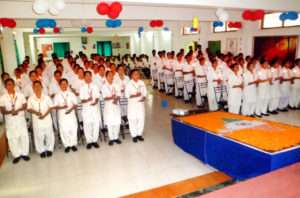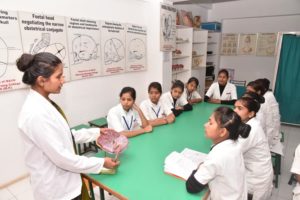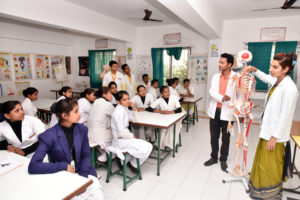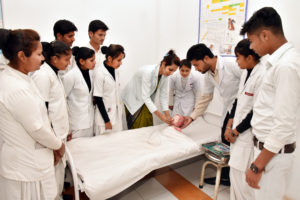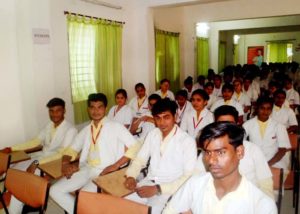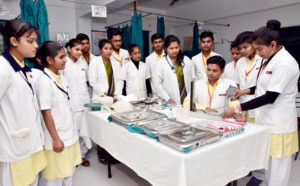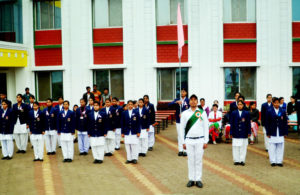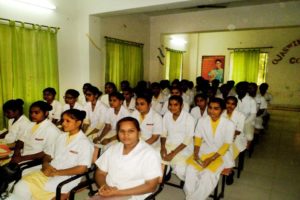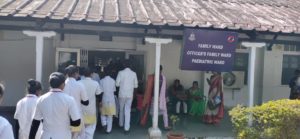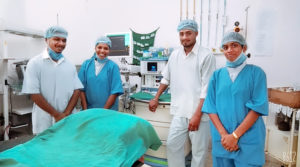COLLEGE OVERVIEW
Ojaswini Nursing College (ONC), promoted by the Brahmi Sundari Nyas Charitable Trust, was established in the year 2000. It is one of the leading institutions in the Bundelkhand Region for nursing education and research. The Trust started the Nursing College in 2006, and it is recognised by the Indian Nursing Council, New Delhi, approved by Department of Medical Education, Bhopal, affiliated to Madhya Pradesh Medical Science University, Jabalpur.
ONC has progressively grown in strength and scope over the years. It has highly qualified faculty, excellent infrastructure and superior clinical partnerships at leading hospitals in Sagar, which provides a wholesome experience in nursing education. The college is situated on a 25-acre campus with lush green surroundings, which provide an ideal academic environment.
VISION
To be a premier institution imparting quality nursing education that effectively combines exemplary clinical skills, a professional outlook, and commitment to humanitarian values.
MISSION
-
To promote high quality education and develop professionalism with a global outlook.
- To promote learning that stimulates students to harness their full potential.
- To foster innovative clinical techniques and research which will improve nursing standards and benefit humanity.
-
To contribute to and disseminate the scholarly evidence-base in nursing and health care.
-
To create empowered, committed, compassionate and skillful healthcare providers who contribute to the building of a healthy family, community and nation.
- To motivate students to become leaders and self-motivators in the professional practice of nursing.
MOTTO
Students at ONC uphold the values of respect for life & dignity of a person from conception to death. The College professes the motto LEARN. SHARE. SERVE
LEARN – Knowledge and skills to provide quality healthcare.
SHARE – Knowledge, and skills with peers to create a holistic and robust healthcare system.
SERVE – Help all people without any distinction on the basis of caste, color or social status.
PHILOSOPHY
We, the staff of ONC believe that the nurses are an integral part of the health care system.
The cornerstone of our nursing philosophy is, “Excellence in education and excellence in practice.” We believe that:
- It is our responsibility to produce skilled, highly competent, qualified nurses, who excel in face the professional challenges
-
Nurses should be trained and equipped with scientific knowledge required to provide comprehensive nursing care.
-
That the nature of Nursing is such that substantial portion of student learning is acquired in clinical area.
-
Skilled and trained nurses are able to understand social and health related problems in the hospital setting and, in the community, at large, and will be able to intervene and work as agents of social change.
- At the end of this training students would have developed leadership qualities which would allow them to address the changing health needs of the society, with love and compassion.
- Developing an attitude of selflessness and service with truth and compassion, are paramount.
- It is important for nurses to strive to promote heath needs and public welfare, through active participation in the society.
-
We have responsibility to the student and society to make provision in the programme for continued development of the student as an individual as a citizen as well as a nurse.
VALUES
- Altruism
-
Autonomy
-
Execution with passion
-
Lifelong learning
- Quality teachings
-
Student success
- Teamwork
OBJECTIVES
The students at the end of their training at degree and diploma levels will:
- Be able to assess and address the concerns and needs of patients.
- Be able to provide comprehensive, individualized care to promote optimal health, based on best current evidence.
-
Develop attributes like - critical thinking, information management, and problem solving skills.
- Be skilled to give quality bedside nursing care at hospitals and community health set up.
- Be aware of the various forces affecting the community health and welfare programmes and be an active enabler in carrying out community health programmes.
-
Develop skills to teach both formally and informally in clinical areas and in nursing education programmes.
- Be able to critically evaluate areas which need improvement and bring about changes.
-
Be able to delegate, guide and co-ordinate the care given by other allied health personnel and non-professional workers.
- Be able to assume greater responsibility and leadership in the healthcare team and direct others to render a high standard of nursing care.
- Be leaders and collaborative members of the healthcare team who advocate for processes and systems to support safe, quality care.
- Be an active contributor to future nursing research initiatives.

